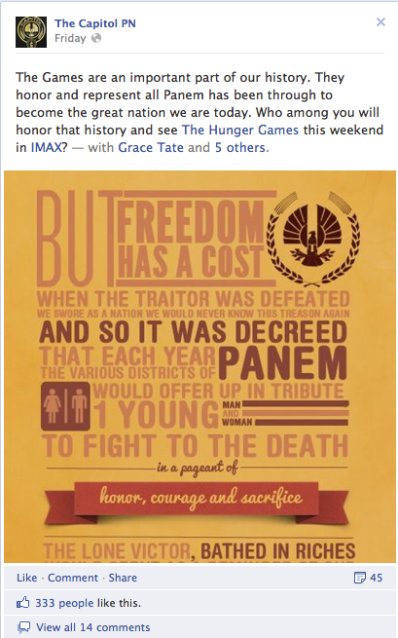Have you read it? The Hunger Games? the full series? been on the Facebook Capitol PN or District pages lately? Dipped into the Twitter feed #LookYourBest?
If you have, you may have noticed something really odd. If you’ve read the first book (now in theaters near you & soon to be released in IMAX!), then you know that Katniss Everdeen volunteers to be a tribute to save her sister, Prim, from certain death.</p><p>In the first novel, we see the poverty of District 12, learn about the uprising of the 12 Districts against the Capitol, the ensuing annihilation of District 13, the brutal subjugation of the remaining 12 Districts and the founding of the Hunger Games as a reminder of the destruction that rebellion and civil war lead to.</p><div> </div> <p>
</div> <p>
In The Hunger Games, Suzanne Collins’ story exemplifies what I have come to see as the moral core of children’s literature, which I have taught roughly twice a year for 10 years now. The power & the truth of children’s lit lies in the valuing of a child’s pov, which in the ‘real’ world, we adults view as immature, naive, ignorant, etc etc, in contrast to the more mature, nuanced & complex understanding adults have as a result of experience and more time spent on earth.
The moral core of good children’s lit is the absolute assertion of the value of the individual relationship against arguments of sacrificing one or many for the greater good. You see this in Huckleberry Finn, where Huck cannot betray the immediacy of his friendship with Jim, even though he believes helping a runaway slave is wrong & will land him in hell. It’s there in The Golden Compass where Lyra always commits to helping those who are being victimized, and she consistently positions herself against the adults in power who kill the weak for the greater good: the children at Bolvangar, Roger… Philip Pullman makes this contrast explicit in Mrs. Coulter’s and Lord Asriel’s complete lack of empathy for those they torture & use respectively.
This moral core is fundamental to Rowling’s Harry Potter series, as Harry, Hermione, Ron & Dumbledore’s Army consistently chose to fight Voldemort’s totalitarian regime. And most importantly, what Rowling makes absolutely clear is that her characters assert their love for one another, and that those bonds exist as an aspect of identity and community that are worth self-sacrifice, as Harry shows us in the final book, but never the sacrifice of others as symbolic or token substitutes.
So, if you’ve only read The Hunger Games, the first novel seems to hew closely to this model. The Hunger Games are an annual sacrifice of two youths for the greater good, Katniss’ volunteering for her sister is a self-sacrifice that saves her sister from experiencing a horrible death played out as spectacle for the entertainment of the Capitol and which the Districts are obligated to witness....
Read my full post here:




No comments:
Post a Comment